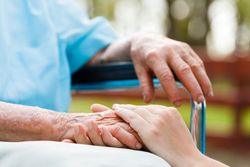
Nursing homes are supposed to provide around-the-clock care. As such, it’s reasonable to assume your aging loved one will not suffer from malnutrition or dehydration as long as he or she is a resident. In reality, though, malnutrition is a serious problem at long-term care facilities around the country. If you think your relative is malnourished because of nursing home neglect, here’s what you should know before proceeding with a claim.
What Causes Elder Malnutrition?
Malnutrition occurs when someone’s diet lacks specific nutrients or does not include enough calories in general. Unfortunately, there are several ways nursing home neglect can lead to malnutrition. If a resident needs help eating, for example, but the employees don’t provide adequate assistance at mealtime, they will inevitably lose a dangerous amount of weight.
Malnutrition can also occur if residents do not have access to certain kinds of food. For example, those with oral health issues may only be able to eat soft foods. If they’re always served dishes that are hard for them to chew, they’ll never consume enough calories at mealtime.
What Can Families Do About It?
 If your loved one is suffering from malnutrition, your family may be able to sue his or her nursing home for damages. As long as you can prove staff breached the duty of care owed to the resident, you should have grounds for a claim. Evidence that will help you do so might include testimony from other residents or their visitors, knowledge of the facility’s standard operating procedures, footage from surveillance cameras on-site, and the victim’s medical records. Thankfully, a resourceful lawyer can help you gather all of the above so your nursing home abuse case has the best chance of success.
If your loved one is suffering from malnutrition, your family may be able to sue his or her nursing home for damages. As long as you can prove staff breached the duty of care owed to the resident, you should have grounds for a claim. Evidence that will help you do so might include testimony from other residents or their visitors, knowledge of the facility’s standard operating procedures, footage from surveillance cameras on-site, and the victim’s medical records. Thankfully, a resourceful lawyer can help you gather all of the above so your nursing home abuse case has the best chance of success.
If your loved one was the victim of nursing home neglect, turn to Reed Law Offices for advice on how to proceed. Based in Omaha, they’re the only firm in Nebraska that focuses solely on resolving nursing home neglect and abuse cases. With the resources of a powerhouse practice, they’re not afraid to go up against even the largest facilities and insurers. To schedule a free consultation with a compassionate elder abuse attorney, call (402) 933-0588. Learn more about Shayla Reed’s legal background online.
About the Business
Have a question? Ask the experts!
Send your question

